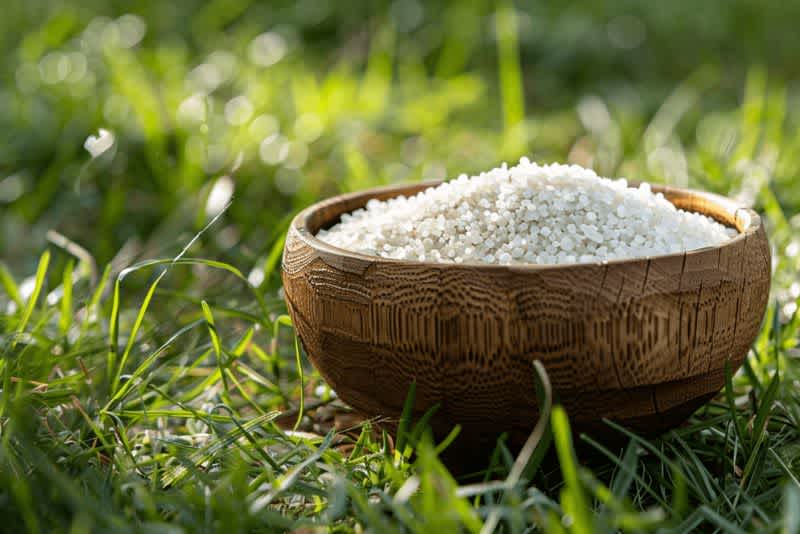Chicken Grit: The Overlooked Key to Healthy Poultry Digestion
Published: February 17, 2024

If you're just starting with chicken care, you may not know the key to chicken grit—an important but often overlooked element of poultry digestion.
Chicks need feed and water, and these tiny poultry grit pebbles help fortify our feathered friends from beak to tail.
We'll cover what type of grit you need and how to deliver it for maximum health impact.
Key Takeaway
Chicken grit is essential for a healthy poultry digestive system, acting as teeth to grind down food in the gizzard.
Two main types of grit are available. Soluble, providing essential minerals like calcium, and insoluble, aiding in mechanical food breakdown.
Introduce grit early in chickens' diets using separate containers or mixed into their feed at a recommended ratio for optimal health.
Selecting the appropriate type of grit depends on the age of the chickens, type of feed, and availability—quality matters.
Proper use of chicken grit ensures better nutrient absorption, healthier birds, and stronger eggshells for productive layer chickens.
What Is the Grit in Chicken Feed?
Chickens, intriguing creatures with a unique digestive system, lack the teeth we humans often rely on to break down food. This is why chicken grit helps and is essential in aiding their digestion. Comprising of coarse small pebbles like gravel or crushed shells, grit acts as the chicken's teeth by grinding down the food in their gizzard, ensuring a healthy digestive tract.
Grit for chickens is crucial for anyone raising these birds, whether in a backyard or on a larger scale. It's not just about providing them with food and water; ensuring access to the right grit is important for increased feed efficiency. Without it, chickens cannot extract nutrients from their feed, leading to potential nutritional deficiencies and health problems.
Grit comes in two main types: soluble, which dissolves in the chicken's digestive system and provides essential minerals like calcium, and insoluble, which remains in the gizzard to aid in the mechanical breakdown of food.
Both types are helpful for the health and well-being of your flock, supporting everything from daily energy needs to the production of strong, healthy eggshells.
Incorporating grit into your chicken care routine is straightforward but indispensable. By understanding its role and importance, you can ensure your chickens lead happier, healthier lives. It's not just about what your chickens eat; it's also about ensuring they can digest it properly with the help of quality grit.
"Poultry which are fed grit have gizzards which are as much as 50% larger than those not fed grit. This results in a more powerful masticating muscle and, consequently, better digestion."
- APPA.org
Types of Chicken Grit and Their Benefits
The world of chicken grit can seem daunting for many poultry keepers. However, understanding the types of grit and their benefits is essential for optimizing chicken health and eggshell quality. Let’s break it down into simpler terms.
Soluble vs. Insoluble Grit: Chicken grit is categorized into soluble and insoluble types. Soluble grit, often made from oyster shells or limestone, dissolves in the chicken's digestive system. This process provides chickens with a vital source of calcium, which is crucial for laying strong and healthy eggs.
On the other hand, insoluble grit, typically composed of gravel or flint, does not dissolve. Instead, it stays in the gizzard to help grind the food, facilitating proper digestion.
Common Grit Materials
Oyster Shell: This soluble grit is a powerhouse of calcium, promoting stellar eggshell strength. Its slow dissolution rate ensures a steady supply of this essential mineral.
Limestone: Similar to oyster shell benefits, limestone grit also supplies calcium but can vary in solubility based on its form.
Flint: As an insoluble grit, flint is paramount for the mechanical breakdown of food, ensuring that nutrients are accessible and digestible.
Benefits of Each Type of Grit
Oyster Shell and Limestone enhance calcium levels, directly influencing eggshell strength and chicken bone health. A diet supplemented with these can prevent the common problem of weak shells, ensuring your flock's productivity remains high.
Flint: By aiding in food breakdown, flint ensures efficient nutrient absorption, supporting your chickens' overall well-being. It supports a healthy digestive process, reducing the risk of impaction and digestive distress.
Incorporating a balanced mix of soluble and insoluble grit into your chickens’ diet can significantly impact their health and the quality of the eggs they produce.
How to Introduce Grit into Chicken Feed

Luckily, introducing grit into your chicken feed doesn't need to be complicated, but it is still important. Believe it or not, chickens have an instinct for grit and can mostly self-manage; however, here are our recommendations.
Best Practices for Mixing Grit with Chicken Feed
Start Early: Introduce starter grit early in your chickens' lives to acclimate them to its presence in their diet. While there has been debate about whether giving them to a few-week-old chicks is helpful, getting chickens used to a particular routine couldn't hurt. We recommend starting them on grit after they leave the brooder.
Separate Containers: Offer grit in a separate container next to their feed. Chickens instinctively know when they need grit and will consume it as required. This method is especially ideal for free-range chickens.
Some farmers like to combine the grit directly in the feed. Just make sure you don't add too much. The APPA recommends around .5% – 0.75% grit-to-feed ratio.
Recommended Quantities and Frequency
The quantity of grit your chickens need depends on their diet. Chickens on a diet primarily of commercial feed may require less grit than those on whole grains or foraging.
A good rule of thumb is to ensure the grit container is always full if using a separate bowl for grit. Chickens will regulate their grit intake naturally.
Again, if you mix grit directly into the feed, ensure it is less than 1% of their feed mix.
Signs Your Chickens Are Getting the Right Amount of Grit
Observation: Watch your chickens. They'll likely get enough grit if they eat well and behave regularly.
Check the Grit Container: A decreasing level of grit in the container is a good sign they’re consuming it as needed.
Incorporating grit into your chicken feed is straightforward but requires attention to detail. By following these best practices, you can ensure your chickens maintain optimal digestive health and continue to thrive.
Selecting the Right Grit for Your Flock
Choosing the right grit for your flock isn't just about picking any old gravel. It's about understanding your chickens' needs and matching them with the right type of grit. Here’s what you need to consider:
Age of Chickens: Young chicks and adult chickens have different grit needs. Starter grit is finer and perfect for young birds, while adult chickens require coarser grit to aid their digestion effectively.
Type of Feed: If your chickens' diet is primarily commercial feed, they might need less grit than those feasting on a diverse range of whole grains or free-ranging.
Availability: Not all types of grit are readily available in every region. Prioritize what's accessible, but don't compromise on quality.
Reviews: Ensure you read the reviews if you're buying from a popular marketplace like Amazon to find the pros and cons of past purchasers.
Forums: Consider reading forums for more insight into the challenges that others have faced.
Recommendations for Sourcing High-Quality Grit:
Agricultural Supply Stores: These often offer a range of poultry supplies, including different types of grit.
Online Retailers: A convenient option like Tractor Supply with reviews to help you gauge quality.
Local Farms or Co-ops: Some may sell bulk grit at a lower cost.
Remember, the right grit can significantly affect your chickens' health and egg production. It may take a few tries to find the right brand for you.
Conclusion
Grit in chicken feed is fundamental in ensuring your flock's health and productivity. Grit facilitates proper digestion, which is essential for nutrient absorption and overall well-being. When selecting grit, consider your chickens' age, diet, and what’s available, always aiming for the highest quality.
Remember, a well-thought-out grit strategy is a cornerstone of effective poultry care. Prioritizing your chickens' nutritional needs, including appropriate grit, lays the foundation for a healthy, productive flock.
By following these guidelines, you can ensure your chickens receive the right support for their digestive health, leading to happier birds and better-quality eggs if you’re raising layers.
Let's support our feathered friends through proper nutrition and care, making the most of the invaluable resources we have at hand.
Common Questions About Grit in Chicken Feed (FAQs)
What works as grit for chickens?
Commercially produced crushed granite or flint and soluble grit like crushed oyster shells or limestone are effective. Natural environmental grit can suffice for free-range chickens, but supplementation is recommended.
What happens if you don't give chickens grit?
Lack of grit can lead to poor digestion, nutritional deficiencies, and decreased egg production due to the inability to properly grind food.
Is chick grit necessary?
Yes, especially for young chickens on varied diets, as it's finer and essential for developing healthy digestive systems. While it may not be required in the first few days of a chick's life, from this point on, it becomes essential throughout an adult chicken's lifespan.
Do chickens need grit with pellets?
While pellets are more digestible, grit aids in the breakdown of any additional foods consumed, supporting overall digestion.
Can chickens eat without grit?
They can, but their digestion of harder-to-digest foods will be impaired, potentially leading to health issues.
Are eggshells grit for chickens?
Eggshells provide calcium but are not a substitute for the insoluble grit needed for digestion.
Keep track of all your cattle with the #1 Cattle Management Software
Try out Ranchr today for free